Leaders of tomorrow must be heard today: Ban
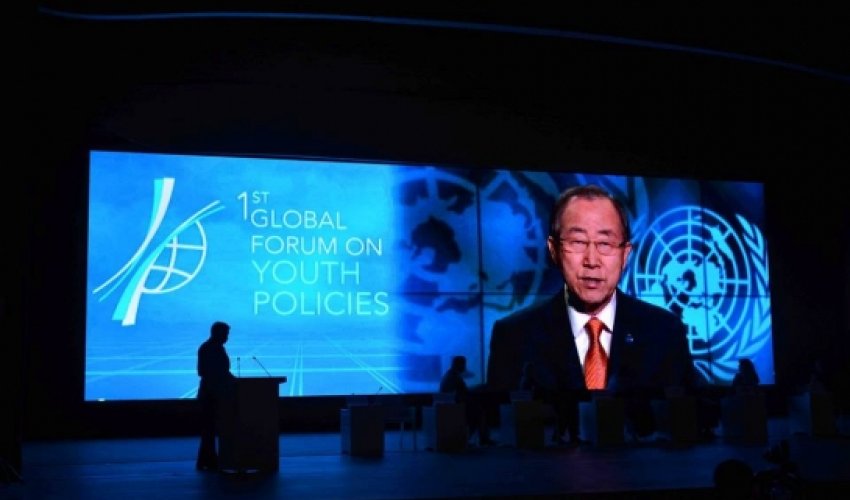
Young people around the world must “raise your voices” so they are heard loud and clear, United Nations Secretary-General Ban Ki-moon told a packed audience of youth ministers, experts, activists and volunteers this morning, kicking off the First Global Forum on Youth Policies, in Azerbaijan, itself a nation with more than half of its population under age 29.
“Young people are the leaders of tomorrow but we need to listen to them carefully today,” said Mr. Ban, in a video message in his opening remarks to the participants to the event, which runs through Thursday in Azerbaijan’s costal capital, Baku.
The UN–backed Forum is the first such gathering bringing together large numbers of experts and officials focused on youth policy.
When young people are adequately empowered and engaged, everyone benefits – from Governments to the private sector to civil society, emphasized Mr. Ban.
For their part, young people must get involved early and often by participating in civic and public life. They have got to speak, and not just at today’s Forum, he said. The message must go beyond the walls of this Forum, to reach a mass audience.
The Forum opened with remarks from several speakers including the Secretary-General’s Envoy on Youth, a message from the President of Azerbaijan, and a host of youth activists. Participants also heard from representatives of other co-conveners including representatives from UN Educational, Scientific and Cultural Organization (UNESCO), UN Development Programme (UNDP) and the Council of Europe.
Later in the afternoon, the Forum heard from a panel comprised of relevant Ministers from Egypt, Albania as well as representatives from the Ibero-American Youth Organization (OIJ) and the Pan-African Youth Union. That panel focused on taking stock of youth policy since the adoption by the UN General Assembly in 1995 of the World Programme of Action on Youth.
“Young people are not asking for support, they are asking for investment,” said Ahmad Alhendawi, the Secretary-General’s Special Envoy on Youth. With of 1.8 billion worldwide and 90 percent of them living in developing countries, he underscored that young people are the world’s biggest and most promising asset for transformation.
In his opening remarks this morning, he said the First Global Forum on Youth Policies is a perfect opportunity to unveil an “invest in youth” logo commemorating that milestone.
The campaign to mark the 20th anniversary of the Programme of Action is meant to generate momentum and revive commitment to youth policy, said Mr. Alhendawi, asking participants to participate in all aspects from spreading the message on social media to getting involved in civic participation at grassroots levels.
“We are in the business of inspiring hope,” he said, adding that the Forum offers an unprecedented opportunity for programmes and partners to address issues facing young people, including the nearly 75 million of those currently unemployed worldwide.
Delivering remarks on behalf of Azerbaijani President Ilham Aliyev his head of the Department Social Political Issues, Ali Hasanov said that since gaining independence some 20 years ago, the country’s economy has rapidly developed and the poverty and unemployment rates have dropped significantly.
Stability, hospitality and tolerance has helped ensure that young people in Azerbaijan are on their way to a bright future, Mr. Hasanov said, highlighting the Government’s adopted agenda which is keen on unveiling young people’s creative potential and tackling youth unemployment.
Calling the conference “historic”, Azerbaijan’s Minister of Youth and Sports, Azad Rahimov, said the participation of over 100 countries indicates that youth issues have become more important and Governments realize that engaging with youth is a “key to the future.”
The next 3 days will delve into achievements and shortcomings of the World Programme of Action by engaging with different agencies and brainstorming how to make youth policy a success all while finding ways to bridge budget gaps.
Next to step to the podium was Magdy Martinez-Soliman, Director of the Bureau for Policy and Programme Support at UNDP, stressing “this is no time for business as usual.”
“Working with vulnerable youth is indispensable if we want to achieve any kind of development,” he said, adding that the World Programme of Action for Youth urged governments that had not already done so to form and implement national youth policies. It set objectives, mechanisms and resources, defined responsibilities and attempted to “steer away of rhetoric declarations.”
Mr. Martinez-Soliman said that over the past 20 years, there has been some important progress, as 60 percent of countries now have national policies. However, these are not always implemented fully due to dysfunctional structures and absence of adequate resources.
“Implementing good policy on youth is not an easy task,” he said, adding that such policy requires long-term political engagement and embracing criticism. Good policy is essential to providing young people with opportunity, strengthening communities and making societies more equal. It also makes governments more willing to participate in consultations on the future sustainable development goals.
He had a direct message to young people: “You do not solely want to be listened to, you are eager to drive change. You want adequate jobs, freedom and rights, a green economy and you want peace.”
Surely, the next generation will inherit our achievements but also our mess, he added. UNDP strategy supports youth participation in politics, building resilience, economic empowerment, and politics turn more legitimate and development.
While young people may lack experience in politics, they are often on the frontline at crisis and emergency zones, he said. Young people’s sacrifice must be duly noted. From conflict zones to the current Ebola crisis in West Africa, emergency response has a “very young face.”
Lalla Aïcha Ben Barka, Assistant Director-General for Social and Human Sciences at UNESCO, said she felt a bit like she was “preaching to the converted” when outlining the benefits of youth policy.
Today more than ever before, the world needs a focused debate to inspire concerted action, she said noting UNESCO’s activities helping young people get involved in developing policies affecting them, enhancing their interaction with the media and developing their labour skills. The diverse nature of today’s forum is a gage of its relevance and a way to ensure that its outcome will be followed up on.
For the next three days, Baku will become “the youth policy centre of the world”, said Snežana Samardžic-Markovic, from the Council of Europe. Youth policy is more than a “buzz word,” it is central to any Government and it needs to exist, “because even a choice not to have Government measures that invest in young people is a form of youth policy.”
Young people are affected by the economic and social situations facing Europe, she said, emphasizing that young people’s access to rights is an essential element to building a culture of human rights and development. “We need innovation and young people [have endless amounts] of it.
Bakudaily.Az
























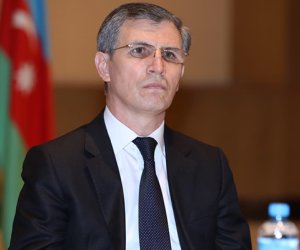
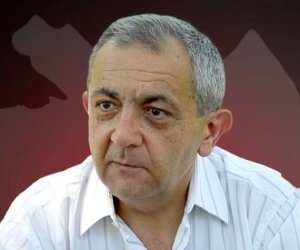
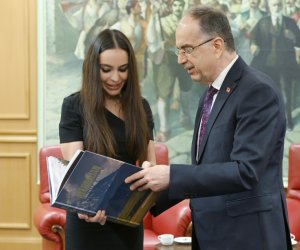
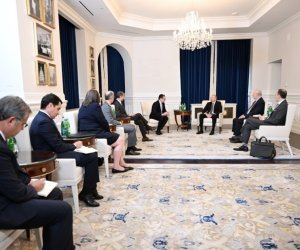

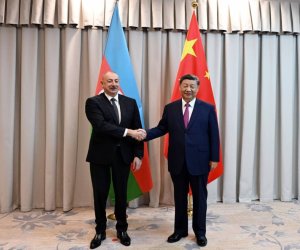
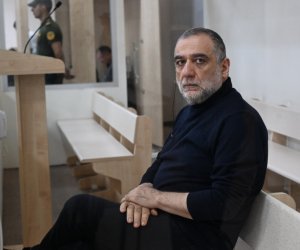
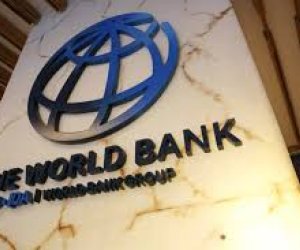
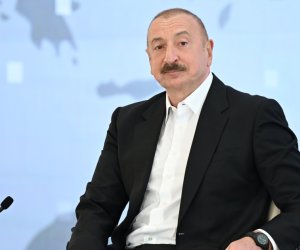



 Photo
Photo 



 Video
Video 

